36 items found for "Show all items"
|
Promoting linguistic skills a priority under the Czech chairmanship of the Committee of Ministers of the Council of Europe |
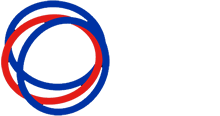 |
|
The Czech Republic took over the chairmanship of the Committee of Ministers of the Council of Europe on 19 May. Among the nine designated priorities of the 6 month chairmanship is the promotion of human rights education and linguistic skills.
View details
|
The Czech Republic continuously develops and improves tools for linguistic and cultural inclusion in Czech schools to help them deal with the increasing number of pupils whose mother tongue differs from the language of instruction. In this connection, the Czech Chairmanship will actively co-operate with the European Centre for Modern Languages of the Council of Europe (ECML) on promoting teachers’ and other language professionals’ capacities to develop linguistic skills and intercultural competences of learners, as a prerequisite for their successful education. In the framework of the ECML’s four-year programme 2016-2019, this co-operation will involve the preparation and organisation of mediation skills, as well as the dissemination of the results of projects focused on the work in multilingual classrooms and the establishment of European standards specifying proficiency levels of sign languages. Cooperation will proceed through the membership of the Czech representative in the ECML Governing Board and through the involvement of Czech experts in the project teams and networks.”
www.coe.int/en/web/chairmanship |
Edit |
|
Common European Framework of Reference for Languages: learning, teaching, assessment (CEFR) – new website |
|
The new CEFR website www.coe.int/lang-CECR offers a large range of different resources, contributed by major European institutions and developed in different research projects and investigations.
The innovative and ambitious website developed by the Language Policy Programme (Education Policy Division, Strasbourg) will continue to evolve with other key resources to be added, in particular a new CEFR Companion Volume.
Available today in 40 languages – including non-European ones – the CEFR has enjoyed an increasing success and is now used in a significant number of countries on several continents. The implementation of the CEFR has also benefitted from development projects and training opportunities offered by the European Centre for Modern Languages.
| Edit |
|
Get ready for the European Day of Languages! |
 |
|
With just over two months to go until the 2017 European Day of Languages, preparations are well underway for hundreds of activities around the continent celebrating Europe’s rich mosaic of languages and cultures. Whether you are interested in learning a new language, taking part in competitions and quizzes, discovering methodologies behind language learning or simply enjoying music, dance, theatre and story-telling from different cultures, there is almost certainly a corresponding EDL event close to you on or around 26 September.
View details
|
You can find a plethora of creative ideas, interesting facts, materials to download, games, activities on the dedicated European Day of Languages website. The site is now available in 36 languages and contains resources for teachers, students and in fact anyone with an interest in languages. We a very much welcome suggestions regarding ‘language trivia’, unique words, amusing idioms, palindromes and the longest words in the languages you know. If you are planning an event, – we are also delighted to promote your activity.
Some new features which will be shortly added to the site are :
• an ‘all the colours of the rainbow’ section featuring characteristics and expressions associated with colours in different languages;
• a directory of language (teacher) associations in Europe (currently containing over 350 associations).
We will also be running a series of competitions and attempting to set a ’world record’ – so it promises to be a busy but exciting next few months… more details on all of the above to follow at: http://edl.ecml.at |
Edit |
|
Liechtenstein: Plurimobil – Language Stay 2.0 – Supporting qualitative and sustainable language courses abroad (Li-Lingua) |
|
Successful adaptation and use of the ECML Plurimobil mobility kit in Liechtenstein.
The Erasmus+ project entitled "Language Stay 2.0 - Supporting qualitative and sustainable language courses abroad (Li-Lingua)", carried out by the Office of Education of the Principality of Liechtenstein (Schulamt des Fürstentums Liechtenstein) with the involvement of the European Centre for Modern Languages (ECML) of the Council of Europe, has been successfully completed.
View details
|
The aim was to make a significant contribution to the promotion of the international dimension in school education in Liechtenstein by promoting sustainable and more efficient learning in language stays of pupils.
The ECML was represented as a partner in the initiative by Mirjam Egli-Cuenat and Katharina Höchle-Maier who accompanied and supported the exchange programme.
Following its completion the initiative was noted as a model of good practice by the external evaluator.
Read the full news item: English - French
|
Edit |
|
News from Language for Work (LfW): Quick guide: How to help adult migrants develop work-related language skills – COMBI Multipliers’ event |
|
(6-7 June 2017, Donostia/San Sebastian, Basque Autonomous Community, Spain)
Matilde Grünhage Monetti, coordinator of Language for Work (LfW) (http://languageforwork.ecml.at was invited to participate in a multiplier event for the COMBI project in Donostia, in the Basque region of Spain, on 6th and 7th June. The project "Communication competences for migrants and disadvantaged background learners in bilingual work environments" is co-funded by the Erasmus+ Programme of the European Union. COMBI partners are acting in various officially bilingual regions in Europe.
Read the full news item: English -
French
| Edit |
|
Participate in the online survey "Promoting excellence in sign language instruction" |
|
The project team invites all interesting parties to participate in their current survey. The information gathered will be crucial to understand which competencies are required in sign language teachers across Europe. Please pass on the link to anyone you think might contribute to this research work:
http://survey.cefr4sl.eu/index.php?sid=57936&lang=en
Full news item on the latest project developments: English - French | Edit |
|
Training and consultancy activities
|
Edit
|
Ireland: RELANG workshop - "Relating language curricula, tests and examinations to the Common European Framework of Reference" (24-26 May 2017) |
|
Stakeholders in curriculum design, curriculum implementation, quality assurance, assessment and training for the new specification attended a RELANG workshop in Dublin from 24-26 May. The RELANG initiative offers training to stakeholders in the Member States of the European Union and the European Centre for Modern Languages (ECML) in relating language tests and examinations to the Common European Framework of Reference for Languages (CEFR) in a valid way and exploring relationships between foreign language curricula and the CEFR.
The article describes how the CEFR relates to the new Junior Cycle MFL specification.
@ Photo: Post-Primary Languages Initiative
| Edit |
|
“Supporting multilingual classrooms”: Recording of the eTwinning seminar available online |
|
Linguistic and cultural diversity is now the norm in European classrooms. What does this mean for teachers, both language teachers and teachers of other subjects? How can teachers adapt their methodology to ensure that this linguistic and cultural capital becomes a rich resource for learning? This seminar aimed to encourage teachers to question their own beliefs as they discover for themselves the answers to these questions and the wide range of free resources developed by the European Centre for Modern Languages of the Council of Europe (ECML) in support of an inclusive, plurilingual and intercultural approach to teaching and learning.
A recording of the seminar involving Sarah Breslin, Executive Director of the ECML, and Terry Lamb, Co-coordinator of the ECML-EC Training and consultancy activity “Supporting multilingual classrooms”, is now available on YouTube. | Edit |
|
Involving parents in plurilingual and intercultural education (PARENTS) |
|
The aim of the PARENTS website is to disseminate knowledge on the benefits of involving parents in plurilingual and intercultural education.
Web resources: English - French
- A number of activities provide parents and teachers with tools that will help them to work together in plurilingual and intercultural education.
-
Video testimonies of a head teacher and an educator; short documentary describing the activities of the Zonarelli intercultural centre in Bologna; and the contribution of a mother.
| Edit |
|
New tools added in the Inventory of ICT tools and open educational resources |
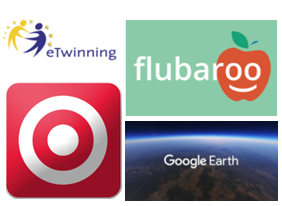 |
|
The inventory of freely available online tools and open educational resources for language teaching and learning has been developed by the ICT-REV project of the ECML for language teachers, teacher trainers, language policy makers and multipliers. It currently contains 92 tools that have been evaluated with specific criteria in mind.
Suggestions for new tools are welcome at any time! Discover the latest resources below:
View details
|
- eTwinning: online platform for staff working in schools in different European countries for collaborating, communicating and building projects together, such as international school partnerships.
- Flubaroo: tool converting quiz answers into grades; designed for helping teachers to grade and to provide feedback to multiple-choice and fill-in-the-blank type assignments.
- Google Earth: with your students you can visit any place in the world without leaving the classroom.
- ipadio: mobile app which allows teachers to make broadcasts through phone calls and then add titles, images etc. to the recording if they wish.
|
Edit |
|
Conference presentation |
|
Edit |
|
Austria: Revised website dedicated to language education - Radio interview with the Austrian Language Competence Centre - Regional seminar on languages and the teaching of subjects |
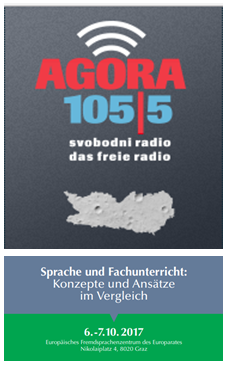 |
|
Language education in Austria: completely revised web section of the Austrian Ministry of Education (in German)
The Austrian Language Competence Centre (ÖSZ), national contact point for the ECML in Austria, has been interviewed on the event “Sprachen-im-Blick” on 28 June. The interview has been commissioned by the Austrian Federal Ministry of Education in cooperation with the teacher training college of Salzburg (Stefan Zweig), and livestreamed on the radio station Agora (Carinthia) on 6 July (2-3 p.m.).
(Re)Listen to the interview on the website of the ÖSZ (in German).
"Sprache und Fachunterricht: Konzepte und Ansätze im Vergleich" (Languages and the teaching of subjects: comparison of concepts and approaches), hosted by the ECML, Graz on 6-7 October 2017, Seminar of the Pedagogical University of Styria and the Austrian Language Competence Centre commissioned by the Federal Ministry of Education, in cooperation with the Federal Centre for Intercultural Affairs, Migration and Multilingualism and with the support of the Council of Europe's Centre for Modern Languages and the Association of the European Centre for Modern Languages in Graz.
| Edit |
|
Canada: Symposium recording "Immersion in higher education" - OLBI's latest news |
|
Symposium ‘Immersion in higher education: Where do we stand today?’ (University of Ottawa, 11-12 May 2017)
The event hosted by the Post-Secondary Immersion Research Group (PSIRG) of the Official Languages and Bilingualism Institute (OLBI) was an extraordinary occasion for researchers, teachers, students, administrators and all others with an interest in the development of immersion in higher education to gather and share experiences, knowledge, and ideas. The programme featured distinguished speakers from Europe and North America who brought to the table unique perspectives and stimulated dialogue on challenges and achievements in the areas of bilingualism, linguistic models and immersion.
View details
|
|
Edit |
|
France: Latest newsletters from CIEP – Results of the calls for projects on "Languages and digital technology" and "Cultural action – French language" |
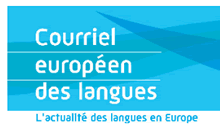 |
|
Latest newsletters edited by the International Centre for Pedagogical Studies (CIEP), the national contact point for the ECML in France:
- Courriel européen des langues, no. 38, May 217: this issue is dedicated to the promotion of ECML projects and the dissemination of ECML tools in France, the latest developments of European institutions and a selection of new resources In the field of language education.
View details
|
Results of the call for projects "Languages and digital technology 2017":
This new edition invites to develop digital and innovative tools that facilitate the development, use and mastery of the French language and the languages of France. 25 projects were selected among the 60 ones received.
View Results : English – French
Results of the national call for projects “Cultural action – French language”
The call for projects launched by the French Ministry of Culture was a great success and resulted in the submission of about 600 projects. The 160 selected projects will allow to improve the access to the French language for a large number of people through artistic and cultural activities. The projects are intended to support the creation and dissemination of tools for stakeholders in the areas of culture, inclusion, training, justice, and in the social and socio-educational fields; and to encourage associations and cultural institutions to develop actions linking the learning of French language and the artistic practice for the benefit of people experiencing difficulties with the French language.
See results: English – French
|
Edit |
|
Germany: Recommendation on the internationalisation of curricula - New LINGO web platform for CLIL lessons |
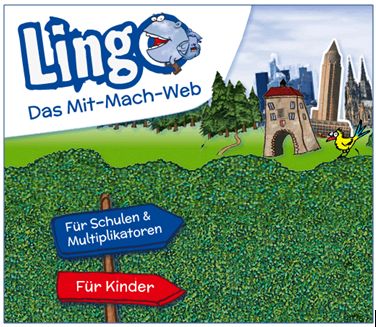 |
|
Recommendation by the General Assembly of the German Rectors' Conference on the internationalisation of curricula: English - German
New LINGO platform for CLIL lessons www.lingonetz.de
From August 2017, LINGO will be the new CLIL platform for young learners in Germany (age groups: 6-12 and 13-16) in the MINT disciplines (mathematics, computer science, natural sciences and engineering).
The multimedial offer is designed to support the learning and teaching of German as a foreign language or German as a second language for children and young people at A1 level. The interactive website offers many new contents, an app, a quiz duel, exciting MINT topics and experiments, interactive exercises, a magazine for children on MINT topics, reading and listening texts, etc.
LINGO is supported by the educational publishing house and agency Eduversum Bildungsverlag and agency, the Department of Foreign Affairs of the Federal Republic of Germany and the Goethe Institute as co-editors.
Lingo editorial team: redaktion@lingonetz.de
| Edit |
|
Greece: New postgraduate programme of studies on language education for refugees and migrants |
|
The Hellenic Open University launches a new postgraduate programme of studies on language education for refugees and migrants.
For more information click here. | Edit |
|
Norway: Evaluation report of the humanities |
|
Edit |
|
Slovenia: Call for papers for the International scientific conference “Language and Culture” (Koper, 27-28 October 2017) |
|
Organised as the 6th biennial conference on “Languages in Contact”.
Venue: Institute for Linguistic Studies of the Science and Research Centre in Koper
Abstracts should be up to 300 words and written in the same language as the presentation and in English.
Deadline for proposals: 15th July 2017.
Four possible thematic areas for the papers: Language and culture within cultural studies; Language, culture and tourism; Culture, plurilinguism and language learning; Language, culture and literature.
Conference website
| Edit |
|
Denmark: New ECML Governing Board member |
|
The ECML is pleased to welcome Ms Sabine Gadeberg Larsen, Danish Ministry of Education, National Agency for Education and Quality, as the ECML Governing Board member. The ECML would like to express its deepest gratitude to Ms Pernille Skou Brønner Andersen for her continuous support and wholehearted involvement in this role during the last years.
Web pages dedicated to Denmark (official contacts, ECML experts, language education resources)
| Edit |
|
Switzerland: Recent publications |
|
Institute for Pedagogical Research and Documentation (IRDP / Intercantonal Conference of Public Education of French-Speaking Switzerland and of Ticino) – Latest publications:
| Edit |
|
Professional Network Forum of the ECML
|
Edit
|
Forthcoming events |
|
The Professional Network Forum of the ECML is comprised of international associations and institutions that share common values and have overlapping expertise in the field of language education and assessment. Under the auspices of the ECML, the members of the Forum share their know-how and work together on areas of common interest in the service of language education.
Members of the Forum: ACTFL, AILA, ALTE, CEL/ELC, CercleS, EALTA, EAQUALS, ECSPM, ECML/Council of Europe, EDiLiC, EFNIL, EPA, EUNIC, FIPLV, IAM, ICC, OLBI.
| Edit |
|
Council of Europe developments
|
Edit
|
Language policies |
|
New toolkit under preparation:
Related ECML thematic collection on languages and migration: English - French | Edit |
|
Framework Convention for the Protection of National Minorities: Latest developments |
|
Developments in Armenia, Austria, Azerbaijan, Bosnia and Herzegovina, Georgia, Hungary, Ireland, Italy, Malta, Montenegro, Norway, Sweden
| Edit |
|
Conference “Learning to live together”: A call for enhanced quality of education for democracy |
|
The conference (Strasbourg, 20-22 June 2017) addressed the promotion of democracy and human rights through education. Around 300 representatives of governments, education institutions and civil society organisations discussed current challenges and opportunities, shared examples of good practices and lessons learnt, and proposed recommendations for future action, including specific criteria and mechanisms for evaluation of progress, in particular in the framework of the Council of Europe Charter on Citizenship and Human Rights Education.
| Edit |
|
Council of Europe education websites |
|
Edit |
|
Launch of the European Roma Institute for Arts and Culture |
|
Last June, the European Roma Institute for Arts and Culture (ERIAC) was officially launched in Berlin at an event organised by the German Federal Foreign Office, the Alliance for the European Roma Institute for Arts and Culture, the Council of Europe and the Open Society Foundations. The new institute will focus on creating a space for under-represented Roma artists, performers and thinkers in the mainstream of European art and culture.
| Edit |
|
Council of Europe Publishing: Latest titles |
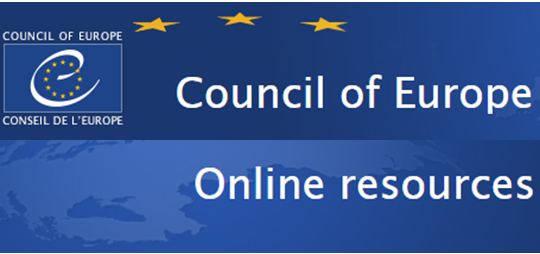 |
|
Report by the Secretary General of the Council of Europe State of democracy, Human Rights and the Rule of Law: Populism - How strong are Europe's checks and balances?
English - French
View details
|
Human Rights and business – Recommendation CM/Rec(2016)3 of the Committee of Ministers to Member States (2016)
English - French
Council of Europe action plan on protecting refugee and migrant children in Europe (2017-2019)
English - French
Migrants in Disaster Risk Reduction - Practices for Inclusion (EUR-OPA)
Available in English only
Cultural participation and inclusive societies - A thematic report based on the Indicator Framework on Culture and Democracy
Available in English only
Annual report on the activities of the European Commission against racism and intolerance (ECRI) covering the period from 1 January to 31 December 2016
Annual report: English - French
Council of Europe press release:
English - French
WE CAN! Taking action against hate speech through counter and alternative narratives
English - French
Human rights: a reality for all - Council of Europe disability strategy 2017-2023
English - French
|
Edit |
|
Key Data on Teaching Languages at School in Europe – 2017 Edition |
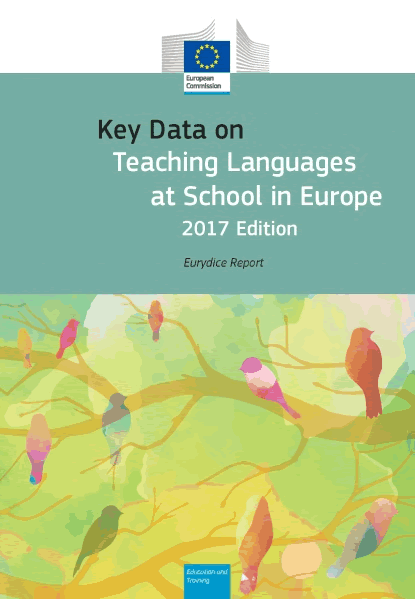 |
|
European Commission/EACEA/Eurydice
There are over 60 official languages in Europe. It is a continent of considerable linguistic diversity, and that breadth is only increasing with recent migration flows. The 2017 Edition of Key Data on Teaching Languages at School in Europe depicts the main education policies regarding teaching and learning of languages in 42 European education systems.
Luxembourg: Publications Office of the European Union, 2017
(E-book available in English; highlights available in English, French, German, Greek, Italian, Polish, Portuguese, Swedish)
View details
|
European Commission/EACEA/Eurydice,
Modernisation of higher education in Europe: Academic staff – 2017 – Eurydice report, Luxembourg: Publications Office of the European Union, 2017 (English only)
European Commission/EACEA/Eurydice, Recommended annual instruction time in tull-time compulsory education in Europe – 2016/17, Eurydice – Facts and Figures, Luxembourg:
Publications Office of the European Union, 2017 (English only)
Eurostat – Migrant integration 2017 edition, Luxembourg: Publications Office of the European Union, 2017 (English only)
European Commission, Erasmus+ Virtual exchanges feasibility study – Final report, European Union, 2017 (English only)
Herzog-Punzenberger, B.; Le Pichon-Vorstman, E.; Siarova, H., Multilingual education in the light of diversity: Lessons learned, NESET II report, Luxembourg: Publications Office of the European Union, 2017
(Full version in English only, summary in French)
Unesco
A guide for ensuring inclusion and equity in education, Paris, 2017
European Students’ Union
Jens Jungblut, Karolina Pietkiewicz (eds), Refugees welcome? - Recognition of qualifications held by refugees and their access to higher education in Europe – country analyses, Brussels, April 2017
OECD
OECD, "Do new teachers feel prepared for teaching?", Teaching in focus, No. 17, OECD Publishing, Paris, 2017
OECD, Starting strong V: Transitions from early childhood education and care to primary education, OECD Publishing, Paris, 2017
OECD, Starting strong 2017:Key OECD indicators on early childhood education and care, OECD Publishing, Paris, 2017
OECD, OECD, International migration outlook 2017, OECD Publishing, Paris,
2017
OECD, Greece: Education policy in Greece: A Preliminary Assessment, OECD Publishing, Paris, 2017
OECD, OECD Reviews of evaluation and assessment in education: Romania 2017, OECD Publishing, Paris, 2017
Mercator European Research Centre on Multilingualism and langage learning
Newsletters edited in April / May / June 2017 |
Edit |